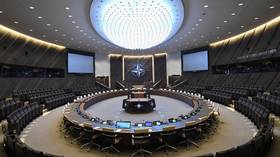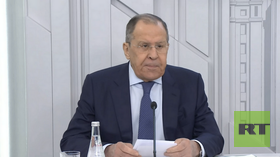NATO response ‘embarrassing’ – Moscow

NATO’s reply to Moscow’s proposals for a European security treaty is entirely ideological and has too much of a focus on the bloc’s so-called “special purpose” and “exceptionalism,” Russian Foreign Minister Sergey Lavrov said on Friday.
Speaking to news outlets as part of a broadcast interview on Friday, the chief Russian diplomat described the response produced by Brussels as “embarrassing” for the people who wrote the text.
Last month, Russia publicly released two treaties it had proposed to the US and NATO. The draft documents included a long list of security guarantees aimed at boosting stability in Europe, such as restrictions on the placement of missiles near the Russian border and the withdrawal of alliance forces in Eastern Europe to their 1997 positions.
While Washington and Brussels called some of the proposals “non-starters,” others were given consideration. On Wednesday, US Ambassador to Moscow John Sullivan personally delivered detailed feedback from both Washington and Brussels, with a view to eventually coming to an agreement and signing a legally-binding treaty.
However, according to Lavrov, NATO’s response wasn’t up to snuff.
“Compared to the paper that was sent to us from NATO, the American answer is almost a model of diplomatic decency,” the Russian foreign minister said. “The response from NATO is so ideological, it has such a sense of exceptionalism of the North Atlantic Alliance, its special mission, its special purpose, that I even felt a little embarrassed for those who wrote it.”
Despite Lavrov’s pessimistic reaction, he also noted that negotiations with both the US and NATO would still continue, as the reply contains some rational responses to a handful of Russia’s proposals.
“I can’t say that the negotiations are over,” Lavrov said. “The Americans and NATO, as you know, have been studying our extremely simple proposals for more than a month… but there are grains of rationality there.”
He did note, however, that the positive progression in the negotiations only came on “secondary” issues, highlighting the fact that the reply from Washington and Brussels ignored Moscow’s desire to receive a legally binding commitment that NATO would stop its eastward expansion. In particular, Russia wants a promise that Ukraine will not be admitted to the US-led military bloc.
Earlier this week, US State Department spokesman Ned Price called “certain elements” in the Russian proposals “absolutely non-starters,” including the idea that NATO would end its ‘open door policy’.
“But there are other areas that – where dialogue and diplomacy could help improve our collective security, transatlantic security,” Price said. “The key point in that is that any steps that we would take would not be concessions. They would need to be on a reciprocal basis, meaning that the Russians would also have to do something that would help improve our security – our security posture.”













